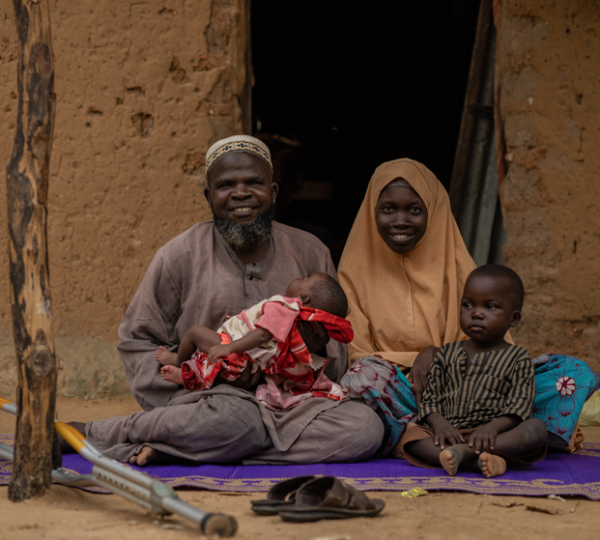Health Policy Reforms: How SFH is Scaling Health Solutions
By Elizabeth Adeyemo and Kenneth Okoineme
Resilient and sustainable health systems are built on good leadership and governance. According to the World Health Organisation (WHO), leadership and governance involve “ensuring strategic policy frameworks exist and are combined with effective oversight, coalition-building, regulation, attention to system design and accountability.” Thus, good governance is policy-centric.
Why Health Policies Are Important
Health Policies are governing decisions made to influence people’s behaviour and actions regarding health. They support and create a framework for health system orientation, funding, resource mobilization, inputs and mechanisms for delivering services. They ensure quality and enhance health system functions and outcomes.
Over the years, non-state actors, including non-governmental organisations like Society for Family Health, have continued to provide the needed support to strengthen health systems on the continent. However, non-governmental organisations can’t always implement interventions directly; sometimes, government policies must change. A clear example is tax increases on tobacco. This reduces the use of tobacco products and an estimated 8 million premature deaths annually while generating revenue for the government to fund other health interventions.
Without health policies, it may be impossible to achieve specific healthcare goals and significantly improve health outcomes within a society. Yet, many African countries face enormous challenges with formulating, effectively implementing and managing policies due to poor planning, inadequate stakeholder engagement, lack of political will, bureaucratic bottlenecks, and a lack of current evidence to inform policy and plans. Other challenges with policy implementation in Africa include lack of clarity, inconsistency or lack of continuity in government policies, non-contextual/specific policies, lack of appropriate technology for implementation and managerial and administrative capacity.
Ultimately, health outcomes are a function of policies, and that means at all times, health policies should be designed to meet the long-term health aspirations of a country, flexible enough to respond to emerging challenges and threats, and consistent across the board to meet the demands of all spectrums of society. Herein lies the need for innovative policy reforms.
SFH has been supporting policy actions, including its conceptualisation, articulation and implementation climate in Africa, drawing from its experience in implementing programmes in communities and working with policymakers in government and other non-state actors.
Over the years, SFH has created a people-centric policy engagement culture that is supporting policymakers to adopt, implement, and reform health policies that bolster health systems and enhance the services they provide. Here’s how.
1. Contextualising policies to be responsive
One hallmark of good policies is contextualising policies to be responsive; policies for any nation must be effective and relevant to the context and needs of the society.
SFH, through the IntegratE project, has been working with the Federal Ministry of Health (FMOH) and the Pharmacists Council of Nigeria (PCN) since 2017 to scale its task-shifting and task-sharing policy nationally by piloting a tiered accreditation system to test a task-shifting model in Lagos and Kaduna states. The National Task Shifting and Task Sharing (TSTS) policy seeks to address the pervasive health workers shortage and accelerate access to the Essential Health Services Package.
The IntegratE project aims to establish a regulatory system that ensures community pharmacists (CPs) and Patent and Proprietary Medicine Vendors (PPMVs) provide quality family planning (FP) services, adhere to FP regulations and report service statistics to the National Health Information Management System (NHMIS).
SFH recognize that PPMVs play a significant part in community health service delivery and are often the first point of contact in communities. Their integration into the health service delivery spectrum can enhance the practicalities of the TSTS policy. However, standardisation and capacity need to be enhanced for this integration to happen, which SFH is currently supporting.
Additionally, SFH, through the Adolescents 360 (A360) Amplify, is demonstrating the place of context in policy and programme responsiveness. The A360 programme collaborates with young people and government health systems to address barriers to access and use of modern contraception among adolescent girls aged 15 – 19. It approaches the intervention through two strategies – one for the northern part of the country, Matasa Matan Arewa (MMA), and the other for the southern part, 9ja Girls programme, in response to the socio-cultural and religious context in both regions. The government at different levels is integrating the A360 model into its ASRH interventions and policies.
2. Co-creation
Co-creative practices are crucial to bringing about systemic change since they help new policies become adaptable to society, relevant, and responsive to its demands.
Working with other development partners and key stakeholders, SFH provided the necessary expertise to develop innovative financing mechanisms for health in Nigeria. SFH provided relevant training for stakeholders, developed modules to institutionalise the Basic Health Care Provision Fund (BHCPF) and contributed majorly to the risk and communication aspect of the BHCPF. The BHCPF is a component of the National Health Act, established to provide primary health care, especially to the poor and most vulnerable. The BHCPF has the potential to speed up progress to achieving universal health coverage. SFH also activated the state-level BHCPF contributory schemes and drug management agencies in Kaduna, Kano, Jigawa, Borno, and Yobe states.
Additionally, SFH, through the Lafiya project, supported the expansion of the ASRH implementation manual to include the Early Childhood Development (ECD) component in Kaduna and Yobe states. As part of the integration process, SFH engaged a variety of indigenous stakeholders in a co-creation process, including a rigorous review and policy development process, to design and integrate the ASRH-ECD manual to guide the implementation of future ASRH-ECD programming. Following the co-creation process, SFH conducted the first-ever ECD baseline assessment in Kaduna and Yobe states to understand the current status of ASRH-ECD in terms of availability, funding, functionality, and geographical spread.
Furthermore, under the A360 programme, SFH engaged the government and other key stakeholders in a co-creation process to review the A360 models and get government buy-in and has since had multiple touch points with them, including annual kick-off meetings and pause and reflect moments. During these meetings, governments revisit accountability metrics that they co-developed and to which they hold themselves accountable and ensure the models align with their priorities.
3. Scaling up existing models and approaches
SFH leverages evidence and learnings in scaling up its health policies and systems strengthening in health interventions.
For instance, evidence generated from the IntegratE project facilitated FMOH’s revision of the TSTS policy, which now allows CPs and PPMVs to provide a broad spectrum of FP services, including injectables and implants, and other primary healthcare services. SFH is scaling up the IntegratE project in five more states in Nigeria to strengthen the retail private sector delivery of Family Planning and Primary Health Care services, including Malaria, Pneumonia, Diarrhoea, Nutrition, and Tuberculosis, to support the TSTS policy.
Similarly, SFH is opening new frontiers for delivering family planning services in Ghana by working with Ghana Health Service (GHS) and other CSOs to integrate family planning methods into the National Health Insurance (NHIS) programme. This expansion is a function of the experience and evidence of the workability of its models for FP services.
4. Supporting evidence-based policymaking
Policymakers require accurate and reliable information to guide efficient and effective decision-making in government.
SFH implements several evidence-informed projects, rigorous research, monitoring and impact evaluation programmes that can generate and disseminate knowledge necessary for developing and refining policies.
Some of these projects are in various areas, including family planning and reproductive health, maternal, neonatal and child health, HIV and TB prevention and treatment, malaria, water sanitation and hygiene (WASH), non-communicable diseases, etc. Through these projects, SFH is bolstering the capacity of government stakeholders and key actors to effectively use and build data and evidence via a wide range of activities, including training and capacity development sessions, co-creation workshops, knowledge building etc.
For example, through the DFID-funded Enhancing Nigeria’s Response to HIV/AIDS (ENR) programme, SFH enhanced the institutional and technical capacity of the Ministry of Health and Education and AIDS control agencies at federal and state levels to plan, manage and implement HIV/AIDS responses in the country, and in the process, led the development of the National Harmonized Organisational and Capacity Assessment Tool (NHOCAT) and the State Unified Operation Plans (SUOP).
The ENR programme also supported the National and State Aids and Reproductive Health Surveys (NARHS and SHARHS) and championed the Modes of Transmission (MOT) studies, which facilitated an evidence-based shift in focus from traditionally defined key populations at risk to the general population as the major source of new HIV infection. The programme went further to increase the understanding of policymakers and programme implementers on how to analyse, interpret, and use data with a gender lens for programme planning and allocative decision-making.
ENR also worked with NACA to establish the National HIV and AIDS Resource Centre (NHRC) to serve as a repository for HIV and AIDS information and survey data in Nigeria.
Additionally, under the World Health Organisation’s Rapid Access Expansion (RAcE) programme, SFH supported the introduction of integrated community case management of childhood illnesses (iCCM) in Abia State. SFH RAcE programme trained and deployed community-oriented resource persons (CORPs) to diagnose and treat malaria, pneumonia, and diarrhoea in underserved hard-to-reach communities in Abia state. Programme learning and implementation research results have informed national policies and programmes, including Nigeria’s task-shifting policy.
Investment is what demonstrates a government’s commitment to policies. SFH creates evidence that highlights the pros and cons and directs government spending in the right direction.
Society for Family Health’s present strategy aspirations provides for continuous work on innovating health policy reforms spurred by its 40 years of vast experience in public health service delivery
Appropriate and effectively implemented health policies are critical to delivering improved health outcomes. An enabling policy climate will make it easier to scale up health interventions. This has the potential to completely revolutionize the healthcare system in Africa.
Society for Family Health (SFH) is an emerging Pan-African organisation with 40 years of experience delivering public health services to the African populace.
Want to learn more about how SFH is scaling health solutions and promoting healthier lives for all? Click here. For more information, write info@sfhnigeria.org




